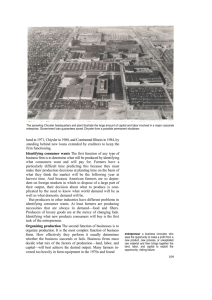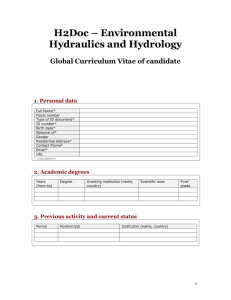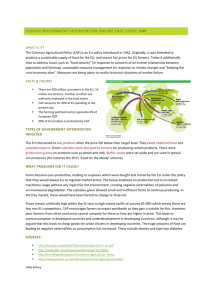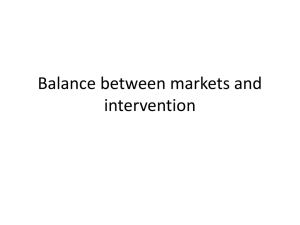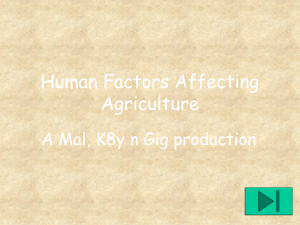challenges on vocational education and training
advertisement
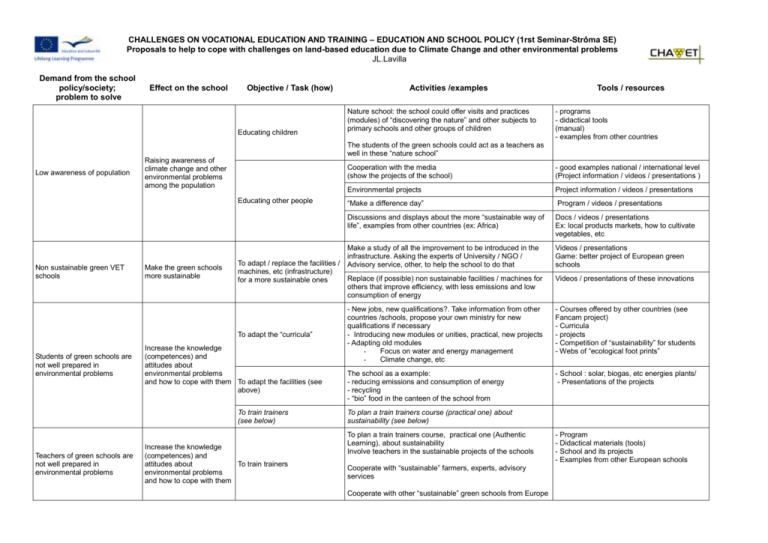
CHALLENGES ON VOCATIONAL EDUCATION AND TRAINING – EDUCATION AND SCHOOL POLICY (1rst Seminar-Strôma SE) Proposals to help to cope with challenges on land-based education due to Climate Change and other environmental problems JL.Lavilla Demand from the school policy/society; problem to solve Effect on the school Objective / Task (how) Educating children Low awareness of population Raising awareness of climate change and other environmental problems among the population Make the green schools more sustainable To adapt / replace the facilities / machines, etc (infrastructure) for a more sustainable ones To adapt the “curricula” Students of green schools are not well prepared in environmental problems Increase the knowledge (competences) and attitudes about environmental problems and how to cope with them To adapt the facilities (see above) To train trainers (see below) Teachers of green schools are not well prepared in environmental problems Nature school: the school could offer visits and practices (modules) of “discovering the nature” and other subjects to primary schools and other groups of children Tools / resources - programs - didactical tools (manual) - examples from other countries The students of the green schools could act as a teachers as well in these “nature school” Educating other people Non sustainable green VET schools Activities /examples Increase the knowledge (competences) and attitudes about To train trainers environmental problems and how to cope with them Cooperation with the media (show the projects of the school) - good examples national / international level (Project information / videos / presentations ) Environmental projects Project information / videos / presentations “Make a difference day” Program / videos / presentations Discussions and displays about the more “sustainable way of life”, examples from other countries (ex: Africa) Docs / videos / presentations Ex: local products markets, how to cultivate vegetables, etc Make a study of all the improvement to be introduced in the infrastructure. Asking the experts of University / NGO / Advisory service, other, to help the school to do that Videos / presentations Game: better project of European green schools Replace (if possible) non sustainable facilities / machines for others that improve efficiency, with less emissions and low consumption of energy Videos / presentations of these innovations - New jobs, new qualifications?. Take information from other countries /schools, propose your own ministry for new qualifications if necessary - Introducing new modules or unities, practical, new projects - Adapting old modules Focus on water and energy management Climate change, etc - Courses offered by other countries (see Fancam project) - Curricula - projects - Competition of “sustainability” for students - Webs of “ecological foot prints” The school as a example: - reducing emissions and consumption of energy - recycling - “bio” food in the canteen of the school from - School : solar, biogas, etc energies plants/ - Presentations of the projects To plan a train trainers course (practical one) about sustainability (see below) To plan a train trainers course, practical one (Authentic Learning), about sustainability Involve teachers in the sustainable projects of the schools Cooperate with “sustainable” farmers, experts, advisory services Cooperate with other “sustainable” green schools from Europe - Program - Didactical materials (tools) - School and its projects - Examples from other European schools CHAVET “Challenges on Vocational Education and Training” 2nd Seminar: “Farms, Industry and Education” Proposals to cope (or help to cope) with the challenges due to changes in agriculture and industry. Problem to solve Effect to the school Farmers´ income is decreasing. If no profit, no Contribute to improvement of farmers, so less farmer's income by good students because they entrepreneurial training for can’t see a future in farmers (adults) and future agriculture. farmers (students) Farmers reputation /image is Students are not being not good attracted to agriculture Objective/ Task (how) Improve the image of agriculture and green sector Improve the skills and attitudes of farmers about “holistic point of view about farming” and “sustainable farming” and “preserving nature” Higher demand for specialized work (e.g. water features, lightening elements, differentiation landscaping/ maintenance...) High demand of qualified workers versus low social status of the profession Challenge for schools To promote entrepreneurship in order they prepare students for new or Better prepare the students for the more specialized jobs future, more specialization, new in “gardening” or competences “landscaping” Insufficient contact between Difficulties with companies and schools training programs, placements, updating programs.... Costumers demand more information from the Challenge for schools in order to prepare To promote networking By José Luis Lavilla Activities /examples Tools / resources - To update programs in trade and economy (young) - To create specific courses for farmers, “authentic learning” experiences: workshops, visits, study cases, trips, panels, etc - New programs - Market niche studies - Study case of “business plans”, young farmers projects, etc - European repertoire of “managerial courses” for farmers and “business plans” -Marketing plan in cooperation with the Media and all the stakeholders - school journal with news - virtual network with old students and families - regular publishing of articles in local and regional newspapers - videos about “farming” or green jobs and disseminate - open door days to schools and farms for urban citizens - fairs, ... - Updating programs for farmers and pupils with the new competences in “sustainability” - Development of new curricula taking - Survey to firms about what they are into account the wishes and demands looking for, new competences, so on...(like of companies Fancam) - More competence oriented training - European repertoire of “specialized - To create networks with students and courses” for gardeners and landscape former students (firms) designer - Examples of networks around Europe To have a flexible and open curricula - To develop networks with firms - To carry out educational and training activities with firms and stakeholders - Updating curricula and programs with the help of firms - Assessment in authentic situation (firms partnership) Promotion of the image and status of horticultural professions To update curricula and programs with - Examples of new programs and activities this new competence of of communication To increase the involvement of firms in education and training - Examples of networks around Europe - List of activities of networks in gardening and landscaping - Examples of good practice (like ALIE) - Problem-based learning professional New needs of the Food Industry about healthy products, fairness, quality assurance such as the HACCP, traceability, etc students for this task of communication Future workers (students) must be trained in these new competences communication Networking Embracing principles of health, - Update curriculum and programs ecology, care and fairness and - To create new courses for workers of legislation enforcement along the the Food Industry whole food chain such as the production of meat from the stable We need to have consistent industry to the table and regarding field involvement in curricular crops from farm to fork. development across borders in EU countries - Curriculum more open, flexible and responsible - Programs for new courses - Good examples of cooperation with Food Industry - Investments at schools The economic and financial - Less interest of Ways to attract students / trainees - Plan of cooperation with the industry - New programs global crises leading to the young people for and to meet the training demands (Education Advisory Board) - Curriculums updated demand of cheap food and these studies, so less in an ever changing industry. - Developing new plans, programs, - Good examples of cooperation with Food loss of jobs. students for the Schools and industry must have opportunities in cooperation with the Industry schools their policy makers liaising and industry and other stakeholders - Less money for cooperating together to plan future investment in schools demands of qualified workers. Bad reputation or bad knowledge of food industry by citizens - Less interest of young people for these studies, so less students for the schools There is a need for public awareness through media. More TV personalities are doing this coverage about food production. Educating the students and the -Extra and intra - curriculum activities community in the reality of food production such as the organization of fairs, exhibitions etc while these events serve as positive PR. Decreasing number of students Low status of VET in some countries Attract new students to the schools not only from agricultural areas Change the picture of the farmer and green sector - Involving the relevant industries - New/other competences - Promoting lifelong learning - Promoting attractiveness of “green sector” - Networks with all stakeholders of the trade - Programs with new competences - Better methods of teaching/learning - Marketing plan for the trade and studies Change the mentality of people See opportunities Change the mentality of teachers, principals and country authorities New curricula -Examples of curricula and programs Children should go to farms to experience life there Innovative schools and young farmers -Promote products, safe food, animal care etc -“Sell” the landscape, make presentations about farms Big competition between schools Split of tourism and agrotourism in some countries Growing mass tourism Curricula are not updated New skills for students and knowledge of economics and negotiating CHALLENGES ON VOCATIONAL EDUCATION AND TRAINING – EDUCATION AND SCHOOL POLICY (3th Seminar, La Louvière BE) Proposals to help to cope with challenges on land-based education due to demands of Education & School Policy JL.Lavilla / E. Bertrand Demand from the school policy/society; problem to solve Quality of education Effect on the school - low results in terms of qualifications of adults and students - If low results of education and training, less students The offer of studies / courses is not updated (oldfashioned, not so large or adapt to respond to the demand and needs of society and enterprises Schools don’t do correctly their role of educating and training for new qualifications and new jobs Objective / Task (how) To improve knowledge, skills, attitudes of teachers (How to develop competences as responsibility, networking,) Activities /examples - To train teachers in new technologies, in project development, in foreign languages, in new pedagogies, in ICT skills. - To develop contacts with enterprises and professionals Tools / resources - Personal training programs that meet the needs of teachers, but taking into account the school's educational project. Such training should be facilitated by schools / Ministry / Institutions and European programs. - Mobility projects for teachers - Exchange of teachers between schools of the same country as well as other countries, company visits To update the offer of courses / programs their contents and methodologies in cooperation with entrepreneurs (trade) as in some countries do (Ej: DK) - To implement into the contents of the courses, new technologies, renewable energies, the ICT, or to create specific courses about these topics. Process to be done in cooperation with entrepreneurs (trade) - To organize courses in entrepreneurial competences addressed to students and adults (ex. Farmers) - Documents, presentations, programs of courses of entrepreneurial competences from different countries to be shared (in a European Fair of « green education tools for teaching entrepreneurial competences»?) - European conference about « How to educate in entrepreneurial competences in green sector? » Placements of students in Low skilled students firms / farms are not enough good (don’t exist or not Low motivation of compulsory, or not enough students time) Low relationship of school with the trade and profession To improve placements (placement to be implemented in all the European countries). It involves students, teachers and entrepreneurs (farmers). - To be implemented, they need: agreements between school/society/Ministry. Students must be prepared for that and be covered by insurance in case of accident (very important subject), farmers / employers must be trained to be « good » professionals-trainers, and also teachers must be trained. - Good practices from other countries (Docs, process, evaluation...), presented in the form of « Repertoire » or in a Fair or in a Conference. - Placements for teachers (experiences, projects in Europe,..) Low level of equipments / machinery at school - To improve equipments and technologies, good adapted, sometimes is necessary to get it by sharing with other schools or in collaboration with the profession / enterprises - To share equipments and machines with other schools - To cooperate with farms/firms in order to do practical works with the students - When the investments must be concentrate in one specialized centre in order to avoid dispersion of resources, agreements of cooperation and sharing must be passed and these centres must be open to different users (students, adults,..) - Good examples in Europe about sharing equipment and machines, as those presented in this seminar : 1- The IPC Centre in The Netherlands 2- The CTA in Belgium (old fashioned, not enough, ..) - Low quality of practical work at school so less knowledge and qualifications acquired by students - The study of a foreign language (English is the most popular) doesn’t exist in « green » VET schools in some countries and/or the results are so weak that demonstrate that the learning process is not good enough Students couldn’t - To improve the study of foreign communicate easily in languages (efficient) in « green » VET another language, so schools it’s very difficult to get a job or a placement abroad, or just to understand some documents written in a foreign language - To increase the number of hours dedicated to learn a foreign language at school at least to 2h/week - To implement the study of foreign languages in the schools/countries where it doesn’t exist - To train foreign language teachers in new methods of teaching in order to be more efficient - To implement the new methods of learning languages at school - Exchanges between « green » VET schools of different countries (it could be using ICT systems) - Trips, visits of groups (students/farmers) from one country to another (mobility project) - Projects for placements of students in other countries (European Net of schools / firms to do these placements) - Methods (innovative), experiences in teaching foreign languages in Europe. Some examples: « Learning by immersion » or « training course of multiple intelligences (Neues Lernen) » And why not ?: «Europea training course for teachers of foreign languages » The validation and transfer of « credit unities » in « green » VET in Europe is not yet implemented - The difficulty to identify / validate the competences acquired during placements, real work or « real life » or even the training courses carried out in another European country doesn’t facilitate mobility in Europe - To structure the courses/programs of « green » VET studies in ECVET unities - To establish a process for validation of competences acquired during placements or real work and real life - To train teachers in order to be able to validate these competences - European experiences of organization of courses/programs in ECVET unities and the process for validation of competences acquired in real work and real life experiences – European project addressed to teachers for elaborating ECVET unities in one or more specialities of « green » VET in levels 2 or 3. For example: * European course for gardeners or farmers * European Tree Worker (ETW) - To create or improve the process of validation of competences acquired during practical work or courses carried out abroad in the « green » sector CHALLENGES ON VOCATIONAL EDUCATION AND TRAINING – CONSUMERS&SOCIETY (5th Seminar, Kaszo HU) Proposals to help to cope with challenges on land-based education due to demands of Consumers & Society JL.Lavilla / E. Hönigsberger Demand from the school policy/society; problem to solve Need to feed the World, avoid food shortage Affordable food Sustainable production of food A considerable number of Effect on the school Objective / Task (how) Challenge / need to educate people (students, parents,..) in this subject To start (or improve) education and awareness of young and adults (students, parents,..) in sustainability, food and fair trade, taking awareness of the effects of monoculture, deforestation, climate change, animal welfare and other .. Challenge / need to educate better future farmers To improve education of future farmers Activities /examples - To convert the school in a sustainable center for production and education - To update programs with new information and new approaches concerning “World food security -FAO”, “Food production systems: industrial one and small farmers one”, “International large scale operations and niche (two-tier approach)”, “Farming technology”, “Trade”, taking conscience of Tools / resources -School as example of sustainability: 1- Farm of the school 2- Kitchen and restaurant of the school 3- Projects of renewable energy, energy efficient, waste treatment, etc 4- Educational activities as courses and program for young and adults - Programs of courses / training - Didactical materials as concerning “food students are not aware of environmental problems or food crisis or “non fair” techniques used in some “industrial” farming, or the waste of food all around the World. in sustainable farming: economically, environmentally and socially Missing awareness of part of The number of students the staff of the school will decrease and the schools will not any The school has not a good long give the services image as “innovative”, they were created for. “environmental friendly” or engaged in the fight against The challenge / need to hunger, destruction of raise awareness on habitats, bad production sustainable farming and techniques in terms of fair trade products pollution or efficiency of energy or non respect for animal welfare. To increase awareness among the staff of the school students and population about the footprints of food – local – national – international production - To update teachers knowledge and competences and increase good attitudes - To train farmers and students (future farmers) using good methods as visiting local businesses in action - To educate and inform population in general, talking about the importance of food and the need of producing it in a sustainable way, not wasting resources, not wasting food - To analyse the situation with scientific and researchers - To get information from consumers - To carry out actions as conferences, fairs courses about these subjects ("from the farm to To improve teaching in order to educate the fork" – Animal welfare, food safety and better future farmers so to contribute to quality,..) in kindergartens and primary schools provide enough food in terms of quantity - To Integrate the food chain in the curriculum and quality for everybody (millennium - To use natural resources for energy an goals) watering – energy balance Under sustainable objectives - To give responsibility to students to sell school products “products get a face” To improve the self sufficient profile of - To create closer contacts with the industries the school, working in authentic way, and farms related to the real world - To develop student centred learning. The school as facilitator The “agricultural” or “green” school must be state-of-the-art concerning environment and good production - To train managers To improve good leadership of the school manager To improve attitudes and of teachers, staying updated and in close relationship with industry Bad image of industrial food Less students will apply To contribute to convert industrial food production (farming) for “agricultural” VET production into a more sustainable non studies pollutant and respecting animal welfare - To develop teaching skills and competences: open-mind, pro-active, etc, learning by doing methods (Authentic Learning) production”: videos, docs, presentations from schools, FAO and other institutions, or made by students, surveys about production and consumption of food in different areas / organic vs. non-organic, transport of food in the World, logistic, environmental and economical impact of food trade. - Study cases: farmers (industrial and small size), processors, consumers associations, etc, regions in the world where farming has resulted in harm to environment, demographics / economics in the World. - Studies, videos, good examples - Subjects in the curricula: group projects about production, economics, marketing and quality - Repertoire of schools environmental friendly (cards with brief description of more innovative European green schools) Some examples of schools’ initiatives: AT: farmer’s market where the school (students) sells its products, ex: cheese or wine or some services in rural area as restaurant / cafeteria ES: students must to elaborate a business plan in “green” sector IT: giving help from the firms, practices in firms / farms - Some competitions or prizes as: Prize “the best school food” Prize “the best environmental friendly school” - Programs for managers and teachers - Documents and didactical materials of these courses - Projects carried out by teachers as: solar energy, rain water for watering the plants, usage of natural resources for energy and water, energy balance - To develop projects and initiatives that will - School, and its “green” projects convert the schools in more environmental - Didactical material: video, docs, friendly ones and to transfer it into the programs presentation, .. Not enough information about small scale production of quality food, local food, organic or non organic production To contribute to improve the image of agriculture and farming as well as the good food and the art of cooking To raise the status of the green professions To make farming sexy (ex. Organic production). The techniques must be updated and be in constant process of change following the transformation of society, firms and consumer’s expectations - To help Authorities and other bodies in the process of changing the image (creating video, teaching courses, didactical material, receiving visits of primary and secondary schools,…) - To start of develop initiatives to promote good food, tastes, cooking, …using local products, maybe from the school. To promote the cooperation between farmers and restaurants and primary and secondary schools - To change the discourse (speech) : food production “from farm to fork” - Use films to start discussion with students and children about negative way of producing and consuming: Supersize me Meet your meat We feed the world Jimmy's global harvest or www.foodwatch.de , and others about positive way of producing and consuming: - Presentation of environmental friendly farms, organic or not, small size farms, local products and how to cook and eat these quality foods. (from farm to fork and from stable to the table, initiatives) - Videos to disseminate the relationship between agriculture, food and health (we are what we eat) - Cooking courses at school?

